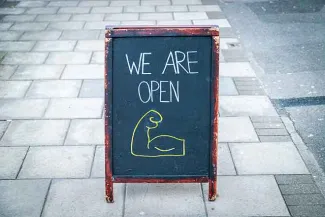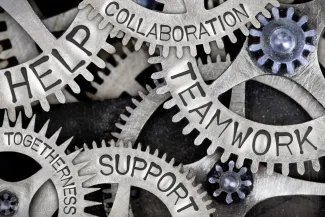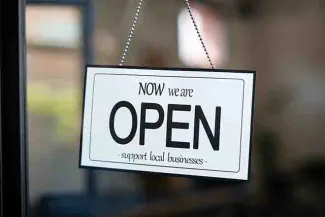
Diversifying the workforce can change companies for the better
(Wyoming News Service) The number of people with disabilities who are working rose last year to 21.3 percent, up from 19.1 percent in 2021. Still, those statistics lag far behind the 65 percent workforce participation rate in 2022 for people with no disabilities.
However, some key factors are helping open doors into the workforce for people with disabilities. For one, employers are recognizing there is a pool of untapped talent in a tight labor market as they look to fill millions of jobs.
At the same time, companies are also trying to diversify their workforces.

© iStock - mikeinlondon
Some advocates see enthusiasm among companies to hire people with disabilities, but stress employers need direction as to how to go about it.
"I think it's come a long way. A lot more people are interested in doing it. But they don't do it for lots of different reasons. Mostly, it's because they come at it the wrong way," says Randy Lewis, who calls himself an accidental disability advocate.
He founded the NogWog (No Greatness Without Goodness) Disability Initiative and advises employers on how to hire people with disabilities.
How One Initiative Changed a Work Culture for the Better
Lewis gained firsthand experience while serving as senior vice president at Walgreens in charge of the supply chain until his retirement in 2013.
There, Lewis created thousands of full-time jobs for people with disabilities when he launched a disability employment initiative in 2007 at a distribution center in Anderson, South Carolina that included workers with intellectual and developmental disabilities.
The mandate - same jobs and same pay as everyone else. It became so successful, it expanded to other locations, and set a national standard. To date, Walgreens says it's shared the model with 400 businesses.
Lewis uses that experience when other companies are looking to hire people with disabilities. His emphasis? Hiring people with disabilities can change everyone around them for the better.

"If somebody calls me up and they say they're interested in hiring people with disabilities, I tell them to go to one of our two buildings that has 30 percent of people with disabilities, a large number of people. The reason to go there is somebody can tell you the facts and cite numbers. But until you see it for real, you won't do it," explains Lewis.
He stresses visiting those centers makes it clear that the workers with disabilities are getting the job done. Besides higher retention rates among workers with disabilities and the bottom line being boosted, the culture makes an impression. "What really gets people to say 'I want to do this' is talking to the managers about what it's like to work there," says Lewis.
Part of the culture, he explains, is a shared goal of success for everyone and an environment where people talk to one another and pay attention to each other.
When Lewis advises companies, he says rethinking their hiring process for workers with disabilities is key. "They'll ask what kind of jobs are good for people with disabilities? But that's not the question you should ask. The first question asked, 'Where do you have hiring opportunities? And what does that job require?' Because there are people with disabilities that can do it," says Lewis.

The idea, he explains, is to match people to skills and advocates the use of a working interview where a potential employee can do an internship and demonstrate their skills. Using peer coaches also adds to success.
Lewis also credits having an executive champion to provide the "fire in the engine" to define an end goal of success and roadmaps to get there. He proved to be that fire in the engine for Walgreens, inspired by his son who has autism. Lewis speaks about his experiences publicly, including a TEDx Talk.
"If you have a sufficient number of people with disabilities, you will change the culture, the entire building. But for sure, the people that work with a person with a disability will be changed for the better," says Lewis.
Smaller Retailers Reflecting Communities They Serve
For smaller retailers without the resources of corporations to develop initiatives to hire people with disabilities, some are finding success without an official human resources policy. One example is Murdoch's Ranch and Home Supply - located in six western states.
"We have 2,300 team members. We have 40 store managers. They have families. They have life experience. They have personal connections in their communities," says Tory Atkins, chief human resources officer for Murdoch's Ranch and Home Supply.
"We have managers whose children or siblings have autism or Down syndrome. They've developed an advocacy for people in those situations. And so, they're in a position to have a positive influence in their community."

© iStock - Ridofranz
Atkins says part of that community includes a longstanding relationship with the Special Olympics.
"I think there's a natural connection that ends up happening when organizations are advocating for people with disabilities - that we're a logical place for them to look because we can hire someone," notes Atkins. "For many people, retail is their first career exposure to a job, their first career opportunity. They're learning lots of life, leadership and professional skills by coming to work for us."
Atkins says workers with disabilities bring a strong sense of positivity and ownership of their work and he adds, it's contagious. "I think it builds a greater sense of team, a greater sense of respect in our work environment when we do have people of different abilities."
To accommodate people with disabilities, Atkins says some employees have job coaches through organizations providing disability services. On the company's end, he says, the only adjustment that is made is pairing an employee with disabilities with a mentor or coach already on the team.
Mentoring Employees with Disabilities
One of those mentors is Marny Huffaker, the store manager at Murdoch's Ranch and Home Supply in Evanston, Wyoming. She was awarded Mentor of the Year in 2022 by Disability:IN in Uinta County, Wyoming and the organization named Murdoch's Employer of the Year in 2020 in Uinta County.
In her eight years as manager, Huffaker says she has hired 10 people with disabilities, mostly intellectual or developmental disabilities.
"I enjoy seeing the accomplishments from others learning a new skill. It actually helps me to work on my skills too, because I learn just as much as they are. I'm teaching them something and they are teaching me," says Huffaker.
She says the store participates in mentoring programs with the county and with high school students who come in each week and learn basic skills. Employees also answer questions about the workforce.
Having people with disabilities on the team, Huffaker says, has a positive effect on workers. "I think it teaches every one of us patience. We're always in a hurry to the next thing and I personally learned patience. It doesn't have to be the fastest job when the job gets done right."
Huffaker says customers seek out specific employees with disabilities, including Tanesha Chandler. "'Hey, where's Tanesha? She can help us,'" says Huffaker.
Chandler is a 33-year-old woman with Down syndrome who works part-time and was dubbed Murdoch's queen of customer service by a local newspaper in 2018. Now in her sixth year at Murdoch's, she says she looks forward to going to work which plays an important role in her life.
"Outside of work, other than her companion service worker, there's not a lot outside of work. So work is her community hub," explains Elaine Chandler, Tanesha's mother.
She says, as someone with a child who has a disability, she's witnessing changes in attitudes and expectations about hiring people with disabilities.
"It depends on the group you are in," explains the elder Chandler. In her community, she credits a disability advocate who had a child with Down syndrome who fought for change. "Just an amazing attitude and so much strength and wanting to build all of these humans up and help them and just have them succeed."
Huffaker summarizes, "I think everybody deserves a chance to be able to work. I think you shouldn't ever hold back on hiring someone with a disability. Ever. I think most of the time, they're going to prove you wrong like, 'I can do this job and I can do it better.' I would never hesitate to hire somebody with a disability."
Ramona Schindelheim wrote this article for WorkingNation.















